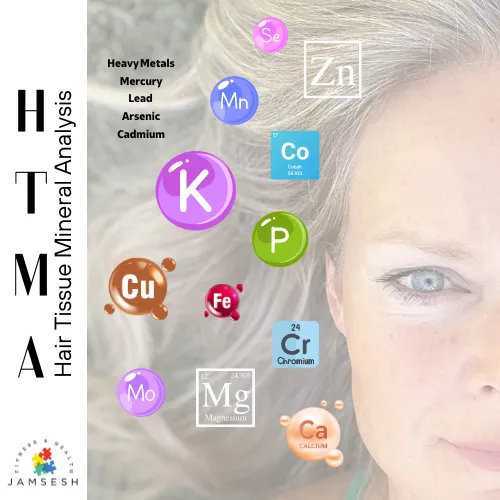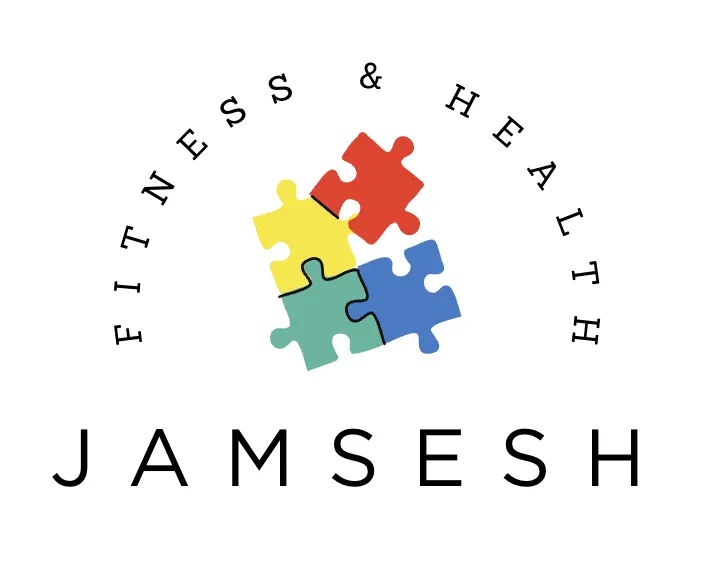
Helping men and women in their 40s and beyond achieve weight loss and feel great in their own skin with simple diet, exercise, and lifestyle strategies. As an online personal trainer, I provide solutions to put all the pieces of your fitness and health puzzle together.
Hair Tissue Mineral Analysis
HTMA

Do you often feel tired or fatigued despite getting enough sleep?
Have you experienced unexplained weight gain recently?
Do you frequently feel anxious or stressed?
Do you suffer from muscle cramps or spasms?
Do you have difficulty concentrating or experience brain fog?
Discover the Benefits of HTMA Testing
To truly understand your body’s mineral needs and imbalances, consider getting a Hair Tissue Mineral Analysis (HTMA) test. This simple, non-invasive test provides a detailed report of your mineral levels, helping you tailor your nutrition and supplementation for optimal health.
Why Get an HTMA Test?
Mineral Levels: It shows what minerals are present in our tissues and whether they are being absorbed into the cells.
Health Conditions: It highlights potential health issues you may have.
Gland Function: It provides insights into how well the thyroid and adrenal glands are functioning.
Blood Sugar: It offers details about blood sugar regulation.
Metabolism: It tells you about your metabolic rate.
Detox Ability: It shows your body’s ability to detoxify and cellular acidity.
Personalized Insights:
By analyzing the mineral composition of hair, HTMA provides insights into an individuals nutritional status, potential imbalances and even exposure to toxic elements. Human hair is composed of various elements, including calcium, magnesium, zinc, iron, copper and others. These minerals are incorporated into the hair as it grows, offering a unique window into the body's mineral metabolism.
Targeted Nutrition:
HTMA is a comprehensive assessment of an
individual's health status, guiding personalized dietary and supplementation protocols.
Enhanced Wellness:
Experience better energy, mood, and overall health. HTMA can help identify underlying factors contributing to various health conditions, including fatigue, hormonal imbalances, digestive issues, and cognitive dysfunction.
Ready to Reclaim Your Energy?
As a Certified Personal Trainer and HTMA Expert Practitioner,
I’m here to guide you every step of the way.
If you feel an HTMA could benefit your health,
let’s work together to create a healthier, more vibrant you—
from the inside out, by booking your consult by clicking the link below, or if you're not quite ready and have a few questions,
book a Discovery Call instead, contact me at i[email protected].
What Your HTMA Test and Consultation Includes
Hair Test from our Professional Laboratory
A Complete Individualized Evaluation of your metabolic type, current mineral levels and ratios and their impact upon the body chemistry
Recommendations of specific foods and food groups, along with an explanation as to why each food group is suggested
Supplement recommendations based upon metabolic type, mineral patterns and specific need as seen on the Hair Tissue Mineral Test Analysis
A 60-75 Minute Zoom or In Person, if local, Consultation to go over test results, providing you with personal recommendations for mineral balancing.
A Minimum 15 page Report of Your Results and Recommendations
HTMA Test and 60 Minute Consultation & Report - $220
Safe and Gentle Way to Detox
Detox programs are all the rage, promising quick fixes and miraculous results.
But did you know that diving into a detox without ensuring your minerals are balanced can do more harm than good?
Our bodies naturally detox every day, but this process relies heavily on having the right balance of minerals.
When minerals are out of whack, it can throw our whole system off, making a detox program less effective and potentially harmful.
Think of your body like a finely tuned engine. Without the right fuel and proper maintenance, it can't run smoothly.
Minerals are the key components that keep everything in balance, ensuring that our internal detox processes work as they should.
Before you consider any detox program, take a step back and ensure your body is prepared.
Balancing your minerals is a gentle way to support your body's natural detoxification process every day, without the harsh side effects of many trendy detox plans.
Hydrate with Mineral-Rich Water:
Drink plenty of filtered water and consider adding a pinch of unrefined sea salt or trace mineral drops to ensure you're getting essential minerals with your hydration.
Incorporate Mineral-Rich Foods:
Include foods high in essential minerals such as leafy greens (kale, spinach), nuts and seeds (almonds, pumpkin seeds), and whole grains (quinoa, brown rice).
Optimize Digestive Health:
Support your gut with probiotics and fiber-rich foods to enhance nutrient absorption and overall digestive function. Fermented foods like yogurt, kefir, sauerkraut, and kimchi are excellent choices.
Prioritize Restorative Sleep:
Aim for 7-9 hours of quality sleep each night. Sleep is crucial for the body’s natural detoxification processes and helps balance hormones and minerals.
Engage in Regular Physical Activity:
Exercise helps improve circulation and lymphatic drainage, which aids in the elimination of toxins. Activities like walking, deep breathing, and light resistance training are excellent for supporting gentle detox.
Practice Stress Management Techniques:
Chronic stress can deplete essential minerals. Incorporate practices like meditation, deep breathing exercises, and mindfulness to help manage stress levels and support overall well-being.
Avoid Processed Foods and Sugars:
Reduce your intake of processed foods, refined sugars, and artificial additives, which can burden the body’s detoxification system. Focus on whole, natural foods instead.
Support Liver Health:
Consume foods that support liver function, such as garlic, onions, beets, and cruciferous vegetables (broccoli, cauliflower). These foods contain compounds that aid in detoxification pathways.
Regular Mineral Check-Ups:
Consider regular HTMA testing to monitor your mineral levels and adjust your diet and supplementation as needed. Personalized consultations can help tailor a plan specific to your body’s needs.

"Tuning In: Simple Steps to Help Manage ADD for a Sharper Mind"
Understanding ADD: A Simple Guide with Everyday Examples
ADD, or Attention Deficit Disorder, is like a radio that can't quite tune into the right station. It involves ongoing issues with focus, impulsiveness, and learning difficulties that don't necessarily include hyperactivity. Think of it as having a brain that's always just a bit out of sync with the surroundings.
Why Does ADD Happen?
Diet: The Fast Track to Trouble
Imagine your brain as a car engine. If you put in bad fuel, like food additives, lots of sugar, or things you’re allergic to, the engine starts to sputter. Kids with ADD often have "good days" and "bad days," much like a car that sometimes runs smoothly and sometimes doesn’t start at all.
Sensory Input: Hearing and Seeing Clearly
Picture trying to have a conversation in a noisy room. If a child has fluid in their ears, it's like having earplugs in all the time. This can make it hard for them to hear properly, affecting speech, intelligence, and learning. Visual issues are like trying to read with foggy glasses—everything is just a bit off.

Nutrient Deficiencies: The Missing Ingredients
Our brains are like complex machines that need the right parts to work properly. Lacking key nutrients is like trying to bake a cake without flour or eggs. Iron deficiency, for instance, can make kids less attentive and more easily distracted. Zinc and omega-3 fatty acids (the healthy fats found in fish) are crucial, much like oil for a car engine.
Heavy Metal Exposure: The Silent Saboteur
Heavy metals, especially lead, are like sneaky thieves that rob the brain of its ability to function well. High levels of these metals are strongly linked to learning disabilities and hyperactivity in children.
Diagnosing ADD: Finding the Right Tools
Food Sensitivities: The Detective Work
Identifying food sensitivities is like detective work. Skin tests are quick and cheap but might miss some clues. Blood tests can give more information but are pricier and more invasive. Keeping a food diary and noting reactions can be like putting together a puzzle, revealing which foods might be causing issues.
Sensory Input: Hearing and Seeing Checks
Simple hearing tests and vision checks are like routine car inspections—they can reveal if something basic needs fixing. More detailed tests from specialists can dig deeper to find hidden problems.
Nutrient Deficiencies: Spotting the Gaps
Sometimes, looking at a child’s diet and physical symptoms can hint at nutrient deficiencies, like noticing if a plant isn’t thriving and figuring out it needs more water or sunlight. Blood, urine, and hair tests can provide a clearer picture, much like detailed soil tests for a garden.
Heavy Metals: The Hidden Danger
Hair analysis is a quick and cheap way to check for heavy metals, much like a canary in a coal mine. More detailed urine tests after taking a special medication can reveal deeper issues, and blood tests add another layer of information.
Managing ADD: Practical Steps
Diet: Fueling the Brain Right
For kids with ADD, it’s crucial to avoid sugary snacks, processed foods, and artificial additives—think of it as avoiding junk fuel for your car. Ensuring they eat balanced meals with plenty of protein and essential nutrients is like providing high-quality fuel to keep the engine running smoothly.
Supplements: The Extra Boost
Many kids with ADD benefit from vitamin and mineral supplements. B vitamins, omega-3 fatty acids, magnesium, and other nutrients can act like booster shots for the brain, helping it function better.
Detoxification: Clearing Out the Toxins
Detoxifying heavy metals is like cleaning out a clogged engine. It needs to be done slowly and carefully to avoid causing more problems.
Behavioral Interventions: The Finishing Touches
Upper cervical spine adjustments and cranial sacral therapy can help improve focus and mental clarity, much like fine-tuning a musical instrument to get the perfect sound.
By understanding and addressing these various factors, managing ADD can become more straightforward, helping children and adults alike to tune into their right station and thrive.
Hair Tissue Mineral Analysis (HTMA) can be a powerful tool in managing ADD by uncovering hidden imbalances and toxicities in the body. By analyzing a small sample of hair, HTMA provides detailed insights into mineral levels and heavy metal exposure.
This information helps pinpoint specific deficiencies or excesses that could be affecting brain function and behavior. For instance, identifying low levels of essential minerals like zinc or magnesium can guide targeted nutritional interventions, while detecting heavy metal burdens like lead can prompt necessary detoxification steps. Through this precise and personalized approach, HTMA offers a clearer path to optimizing brain health and improving symptoms associated with ADD. TEST DON'T GUESS.
If you would like to learn more about HTMA testing, email me at [email protected] and see HTMA (Hair Tissue Mineral Analysis) page on my website at jamseshfitness.com.

© Copyright JAMSesh Fitness and Health 2024

